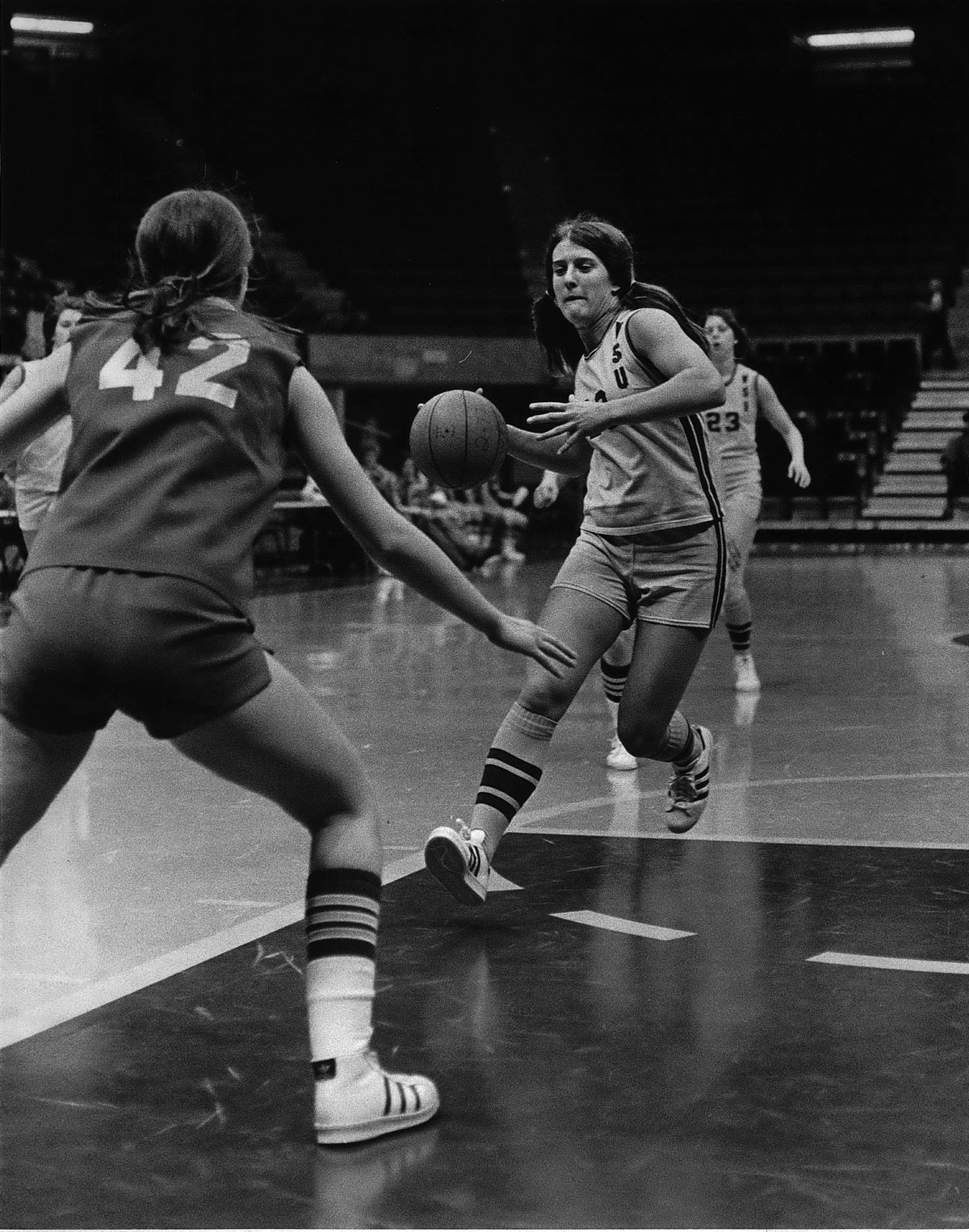Half a century later, WSU’s history-making female athletes reflect on the fight for Title IX
WSU basketball player Jeanne Eggart Helfer in 1978. (The Spokesmn-Review photo archive)
For Karen Troianello, there’s no tearjerker quite like the state girls cross country meet in Pasco each year.
“I still cry sometimes,” Troianello said.
But they are tears of joy, shed for the female athletes of today who are the beneficiaries of Title IX and the hard work of Troianello and other women at Washington State University.
Because they decided to run uphill against all odds, the path is that much easier for the young women of today.
Thursday is the 50th anniversary of Title IX, the federal civil rights law that has been credited with profoundly changing education in the United States by barring sex discrimination in the nation’s schools.
Along with other equity laws that followed, Title IX helped to unlock access to educational and athletic opportunities, paving the way for inroads into historically male‐dominated professions.
“We have come from a time that we were telling girls that you cannot be a doctor, you cannot be an athlete, because you are a girl,” said Lynn Hickey, a former women’s basketball coach and now the athletic director at Eastern Washington.
“In this day and age, that seems unbelievable,” Hickey said.
It certainly felt that way a few months ago for the current WSU women’s basketball players as they listened to WSU legend Jeanne Eggart Helfer talk about the old days.
“You could hear a pin drop,” said Helfer, one of the greatest players in WSU history.
“They couldn’t believe that we didn’t get practice gear until my junior year, that we drove vans to away games.”
In that sense, Title IX has come full-circle at WSU, which in the late 1970s was ground zero for the cause of women’s sports.
When Title IX was passed in 1972, supporters hoped it would make a difference to college women athletes.
“You thought it would, for about 10 minutes,” Jo Washburn, former WSU associate director of intercollegiate athletics for women, told the Seattle Times in 2012, on the 40th anniversary of the passage of Title IX.
“Then nothing happened, nothing happened and nothing happened, and excuses were made and so on. You then soon woke up that it was going to be a long, hard fight,” Washburn said.
When Troianello, the former Karen Blair, left her native Bellingham for Pullman in the fall of 1976, track and field was one of just five women’s varsity sports at WSU.
The others were still classified as club sports, while the 10 men’s programs were recognized, funded and competed on a national level.
Sue Durrant, who coached Cougars basketball for 19 seasons and volleyball for 12 in a 40-year career that began in 1962, said the system was so stacked against women, that when the coaches went out to raise funds for their programs, some people in the university would tell potential donors to ignore the pitch because women’s coaches “were just trying to do away with men’s athletics.”
“Men did not view sports as something women should do,” Durrant said.
Blair and 38 other female athletes at WSU took up the fight, alleging they were being denied an equal education by WSU because the women’s athletic programs were of lesser quality than the men’s programs, and that they were victims of sex discrimination.
Mary Ellen Hudgins, litigation director of the fledgling Northwest Women’s Law Center in Seattle, was willing to take up their cause. Hudgins sued not under Title IX, but the state’s Equal Rights Amendment.
The fight, ultimately, took eight years to win, but the benefits for women were incalculable.
At WSU and other colleges around the country, it meant there would be no more hand-me-down uniforms, no more caravans to competitions while male athletes rode team buses or planes.
In 1972, only about 30,000 women participated in some type of intercollegiate sport; today there are 215,000.
The numbers are even more staggering in high school, which in five decades has seen an increase from 294,000 participants to almost 3½ million, according to the Women’s Sports Foundation.
“It’s really nice to see the impact that it has in education and not just athletics,” Durrant said. “You go back, and what could women be? A teacher, a nurse, a librarian?”
“That’s how much impact it had,” Durrant said.
The impact has been even more transformative than that, said Hickey, the athletic director at EWU since 2018.
After fighting an uphill battle as a standout basketball player, coach and administrator in Oklahoma, Kansas and Texas, she’s come to appreciate the larger impact of Title IX.
It was the little things that hurt most.
At Kansas State in the 1980s, the men’s team had its own band and cheerleaders. But when Hickey sought out the band director, she was told, “Lynn, we just don’t have time. We can’t do this.”
“So he gave me a copy of their 8-track tapes and said, ‘You can play this during your game,’ and I went, ‘Oh my God.’
“I left his office in tears.”
Things were getting better by the time Helfer arrived in Pullman in the late 1970s.
The first women’s basketball player to receive a WSU scholarship, she went on to become the program’s leading scorer and to coach high school ball at Mead.
“I felt like I was the recipient of a lot of people’s hard work,” Helfer said this week.
Those days are long gone, but there’s still plenty of work to do.
Last year, the NCAA was rocked by scandal at its signature event, the national basketball tournaments.
Compared to the men, women were shortchanged by poor workout facilities and other indignities.
Marcia Saneholtz, an athletic administrator at WSU from 1979 to 2007 and a nationally recognized leader in Title IX legislation, appreciates the progress made so far.
“Obviously, we’ve made gigantic strides, although we have a long way to go, especially in marketing, and we need more women in coaching and administration,” Saneholtz said.
Saneholtz sees more challenges from the addition of the transfer portal and NIL money that is going disproportionately toward male athletes.
“And the arms race is still going on,” Saneholtz said. “You build a great facility, and someone else builds something even better. Who knows when it’s all going to stop?”
But for Troianello, the 50th anniversary of Title IX is a chance to reflect – and yes, to cry those tears of joy.
“I feel very emotional that these girls have this opportunity and they’re not shunted off to the side,” she said.

